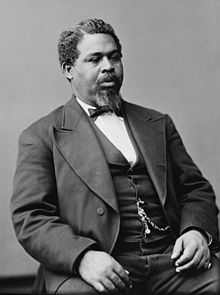Robert Smalls
| Robert Smalls | |
|---|---|
 |
|
| Member of the U.S. House of Representatives from South Carolina's 7th district |
|
|
In office March 18, 1884 – March 3, 1887 |
|
| Preceded by | Edmund W. M. Mackey |
| Succeeded by | William Elliott |
| Member of the U.S. House of Representatives from South Carolina's 5th district |
|
|
In office July 19, 1882 – March 3, 1883 |
|
| Preceded by | George D. Tillman |
| Succeeded by | John J. Hemphill |
|
In office March 4, 1875 – March 3, 1879 |
|
| Preceded by |
District re-established John D. Ashmore before district eliminated after 1860 |
| Succeeded by | George D. Tillman |
| Member of the South Carolina Senate from Beaufort County |
|
|
In office November 22, 1870 – March 4, 1875 |
|
| Preceded by | Jonathan Jasper Wright |
| Succeeded by | Samuel Greene |
| Member of the South Carolina House of Representatives from Beaufort County | |
|
In office November 24, 1868 – November 22, 1870 |
|
| Personal details | |
| Born |
April 5, 1839 Beaufort, South Carolina |
| Died | February 23, 1915 (aged 75) Beaufort, South Carolina |
| Political party | Republican |
| Spouse(s) | Hannah Jones (until 1883) Annie Wigg |
| Religion | Baptist |
| Military service | |
| Allegiance | United States of America |
| Service/branch | U.S. Navy and U.S. Army |
| Years of service | 1862–1868 |
| Rank | None (civilian pilot and armed transport captain) |
| Battles/wars |
Blockade of Charleston 17 battles including Sherman's March to the Sea |
Blockade of Charleston 17 battles including
Robert Smalls (April 5, 1839 – February 23, 1915) was an enslaved African American who, during and after the American Civil War, gained freedom and became a ship's pilot, sea captain, and politician. He freed himself, his crew and their families from slavery on May 13, 1862, by commandeering a Confederate transport ship, CSS Planter, in Charleston harbor, and sailing it from Confederate-controlled waters to the U.S. blockade. His example and persuasion helped convince President Lincoln to accept African-American soldiers into the U.S. Army and the U.S. Navy.
Smalls was born in Beaufort, South Carolina. After the American Civil War, he returned there and became a politician, winning election as a Republican to the South Carolina State legislature and the United States House of Representatives during the Reconstruction era. As a politician, Smalls authored state legislation providing for South Carolina to have the first free and compulsory public school system in the United States. He founded the Republican Party of South Carolina. Due to the state's white Democrats disfranchising most blacks (who made up much of the Republican Party), Smalls was the last Republican to represent South Carolina's 5th congressional district until 2010.
Robert Smalls was born in 1839 as a slave in a cabin behind his master Henry McKee's house on 511 Prince Street in Beaufort, South Carolina. He grew up in the city under the influence of the Lowcountry Gullah culture of his mother, Lydia Polite, a slave of the McKees. His father's name was Robert.
...
Wikipedia
